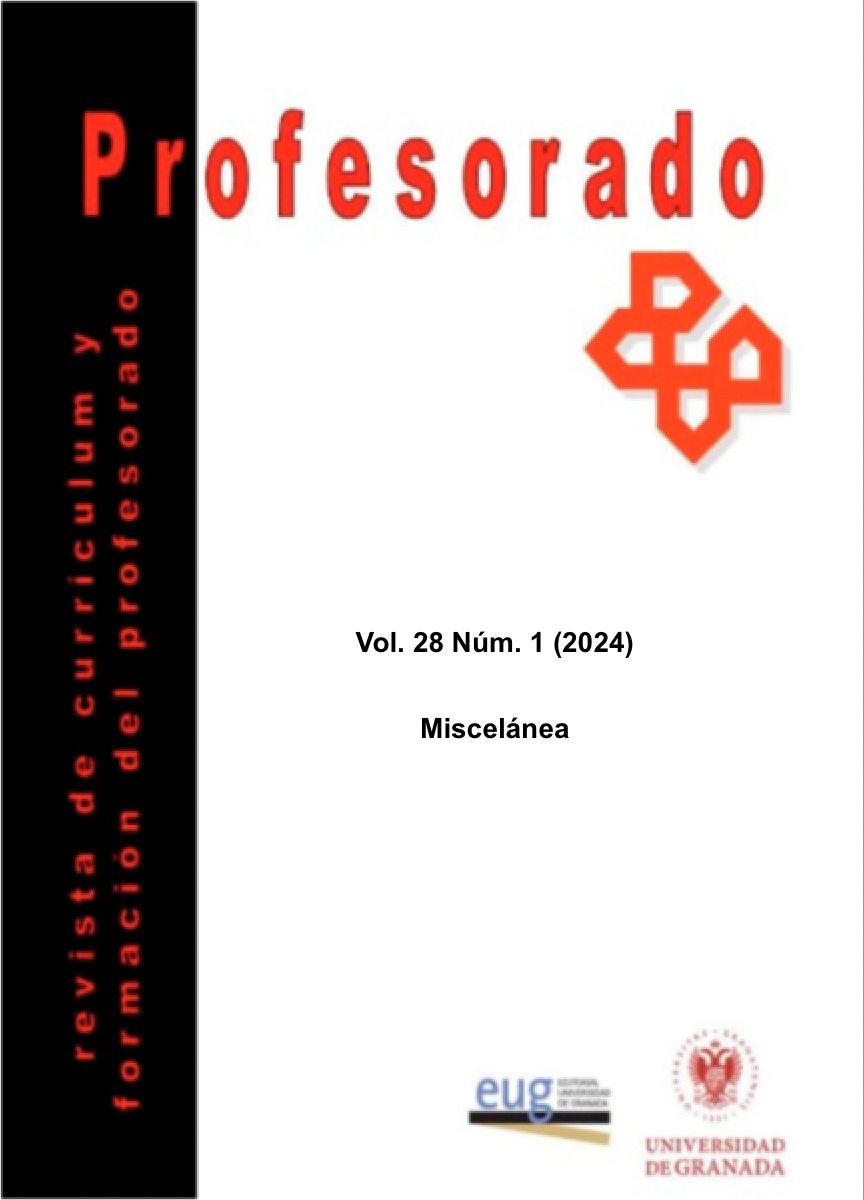La Evaluación de un modelo de Innovación Pedagógica basado en Comunidades Profesionales de Aprendizaje
DOI:
https://doi.org/10.30827/profesorado.v28i1.28014Keywords:
Comunidades de Aprendizaje, Educación universitaria, innovación pedagógica.Abstract
During the participatory construction of the Global Development Plan of the National University of Colombia (UNAL), the need was identified to strengthen collaborative learning among teachers, who face similar pedagogical problems, but solve them independently, and do not usually share their reflections, learning and results with the academic community. Within this framework, the Pedagogical Innovation Initiatives Incubator Project (I3P) was implemented to invite the academic community to propose innovation projects focused on improving students' learning experiences, participating in an open innovation model as a tactic to promote the formation of Professional Learning Communities (PLC). During the project, 61 innovation initiatives were designed and implemented with the participation of 62 teachers, 197 students, 28 graduates and 17 administrative staff, from 7 sites and 23 faculties, benefiting 4239 students. The evaluation of the application of the innovation model was carried out through the application of an observation rubric to determine the degree of development of the CPAs, and the application of a questionnaire, which was answered by 201 participants. The results indicate that the I3P pedagogical innovation model favors the formation and evolution of CPAs, as long as the participants have common interests and the communication and teamwork processes are properly managed.
Downloads
References
Álvarez, E. y Álvarez, M. (2018). Estrategias y prácticas de la innovación abierta en el rendimiento empresarial: Una revisión y análisis Bibliométrico. Profesorado. Revista SCIELO. http://www.scielo.org.mx/scielo.php?script=sci_arttext&pid=S2448-76782018000100004
Bayat, P., Daraei, M. y Rahimikia, A. (2022). Designing of an open innovation model in science and technology parks. Journal of Innovation and Entrepreneurship, vol. 11, no. 1, 2022, doi:10.1186/s13731-022-00203-w.
Bolam, R, McMahon, A, Stoll, L, Thomas, S, & Wallace, M, with Greenwood, A, Hawkey, K., Ingram, M., Atkinson, A. & Smith, M. (2005). Creating and Sustaining Effective Professional Learning Communities, DfES Research Report RR637, University of Bristol Ver en: http://dera.ioe.ac.uk/5622/1/RR637.pdf
Bolívar, A. (2007). Los centros educativos como organizaciones que aprenden. Madrid: Editorial La Muralla.
Bolívar, R. (2017). Los centros escolares como Comunidades Profesionales de Aprendizaje. Adaptación, validación y descripción del PLCA-R. Universidad de Granada. Tesis doctoral.
Dirección Nacional de Innovación Académica - DNIA. (2019). Plan de Acción 2019-2021.
Duarte O. G; Layton S; Carrillo F. J. Innovación Pedagógica en el contexto universitario. In submission.
García, L. M. (2011). Encouraging teachers’ and students’ innovation with the support of teacher learning communities. Center for Educational Policy Studies Journal, 1(1), 133–152. Retrieved from https://www.scopus.com/inward/record.uri?eid=2-s2.0-84896922430&partnerID=40&md5=85cfe0c2c73d4b34e8a77e0af99ce727
Havelock, R.G. y Huberman, A.M. (1980). Innovación y problemas de la educación: teoría y realidad en los países en desarrollo. UNESCO.
Hipp, K., y Huffman, J (2010). Demystifying professional learning communities: School leadership at its best. Lanham, MD: Rowan & Littlefield.
Hord, S. M. (1997). Professional Learning Communities : What Are They And Why Are They Important? Issues About Changes, 6(2), 1–7.
Huberman, A.M. (1973). Cómo se realizan los cambios en la educación: una contribución al estudio de la innovación. UNESCO.
Juca-Aulestia, J. M.; Iriarte-Solano, M.; Andrade-Vargas, L. D.; Estevao-Romeiro, A. Modelo de innovación abierta centrado en la universidad. 2022 17th Iberian Conference on Information Systems and Technologies (CISTI)22 – 25 June 2022, Madrid, Spain ISBN: 978-989-33-3436-2
Lomos, C., Hofman, R.H., & Bosker, R.J. (2011b). The relationship between departments as professional communities and student achievement in secondary schools. Teaching and Teacher Education, 27(4), 722- 731.
Medina, L., Guzmán, L. L. (2011). Innovación curricular en instituciones de educación superior. Pautas y procesos para su diseño y gestión. Asociación Nacional de Universidades e Instituciones de Educación Superior.
Merino, C., Livia, J. (2009). Confidence intervals for the content validity: A Visual Basic computer program for the Aiken’s V. An. Psicol. 25, 169–171.
Ramírez, M. S; Valenzuela, J. R. (2017). Innovación educativa: Investigación, formación, vinculación y visibilidad. Madrid. Editorial Síntesis S.A.
E. M. Sánchez-Teba, M. Rodríguez-Fernández, and A. I. GasparGonzález, “Social networks and open innovation: Business academic productivity,” Journal of Open Innovation: Technology, Market, and Complexity, vol. 7, no. 2, 2021, doi: 10.3390/joitmc7020158
Sánchez Cortés. Escuela de Administración de Negocios, Colombia. 8(2016), 12–13.
Souza, C.; Pfeiffer, F.E; Mendes de Oliveira, J. (2015), Transferencia de aprendizaje y complejidad de tareas: “la carreta delante de los bueyes” interamerican journal of psychology, vol. 49, núm. 3, pp. 294-301 Sociedad Interamericana de Psicología San Juan, Puerto Rico. Disponible en: https://www.redalyc.org/pdf/284/28446020002.pdf
UNESCO. (1975). El tiempo de la innovación en materia de educación.
Universidad Nacional de Colombia. (2019). PGD 2021. Plan Global de Desarrollo 2019 – 2021: Proyecto Cultural y Colectivo de Nación. Universidad Nacional de Colombia.
Vázquez, R., López M. (2016). El entorno organizacional de aprendizaje (OLE) como estrategia para la construcción de un liderazgo basado en la comunidad. Conference Paper. https://www.researchgate.net/publication/311709655_El_entorno_organizacional_de_aprendizaje_OLE_como_estrategia_para_la_construccion_de_un_liderazgo_basado_en_la_comunidad
Vescio, V., D. Ross, and A. Adams (2008). A Review of Research on the Impact of Professional Learning Communities on Teaching Practice and Student Learning. Teaching and Teacher Education 24 (1): 80-91.
Downloads
Published
Versions
- 2024-04-08 (2)
- 2024-03-22 (1)















